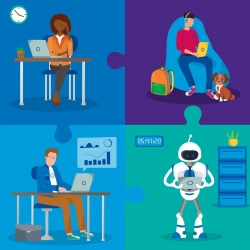To provide the best experiences, we use technologies like cookies to store and/or access device information. Consenting to these technologies will allow us to process data such as browsing behaviour or unique IDs on this site. Not consenting or withdrawing consent, may adversely affect certain features and functions.
The technical storage or access is strictly necessary for the legitimate purpose of enabling the use of a specific service explicitly requested by the subscriber or user, or for the sole purpose of carrying out the transmission of a communication over an electronic communications network.
The technical storage or access is necessary for the legitimate purpose of storing preferences that are not requested by the subscriber or user.
The technical storage or access that is used exclusively for statistical purposes.
The technical storage or access that is used exclusively for anonymous statistical purposes. Without a subpoena, voluntary compliance on the part of your Internet Service Provider, or additional records from a third party, information stored or retrieved for this purpose alone cannot usually be used to identify you.
The technical storage or access is required to create user profiles to send advertising, or to track the user on a website or across several websites for similar marketing purposes.
 The swift rise of generative artificial intelligence and its potential impact in the workplace puts people professionals at the heart of understanding how this fast-evolving technology can be responsibly used, and the business impact it may have, according to the CIPD. To support this change, the trade body has launched a new guide, Preparing your Organisation for AI Use, which stresses the importance of people professionals creating clear policies on the use of easily accessible, web-based generative AI tools such as ChatGPT and Google Bard. (more…)
The swift rise of generative artificial intelligence and its potential impact in the workplace puts people professionals at the heart of understanding how this fast-evolving technology can be responsibly used, and the business impact it may have, according to the CIPD. To support this change, the trade body has launched a new guide, Preparing your Organisation for AI Use, which stresses the importance of people professionals creating clear policies on the use of easily accessible, web-based generative AI tools such as ChatGPT and Google Bard. (more…)




































July 12, 2023
Generations in the workplace: setting the record straight
by Jo Sutherland • Comment, Workplace